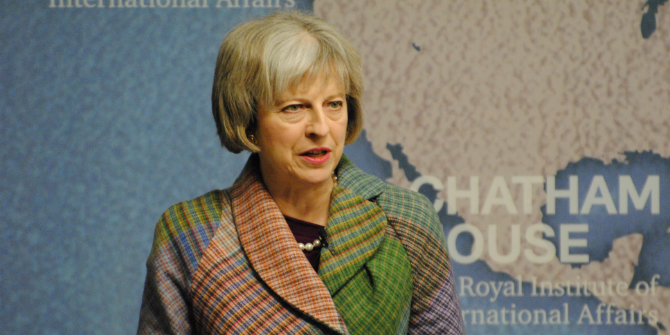 It should have surprised nobody that it took a bare three months for Theresa May to metamorphose from tepid advocate of continuing British membership of the European Union into an enthusiastic proselytiser at the Conservative Party conference for the benefits of “national sovereignty and independence” outside the Union. Brendan Donnelly explains that the PM’s metamorphosis into an ardent Brexiteer has to be analysed in the context of the historical struggle within the Tory party over Europe.
It should have surprised nobody that it took a bare three months for Theresa May to metamorphose from tepid advocate of continuing British membership of the European Union into an enthusiastic proselytiser at the Conservative Party conference for the benefits of “national sovereignty and independence” outside the Union. Brendan Donnelly explains that the PM’s metamorphosis into an ardent Brexiteer has to be analysed in the context of the historical struggle within the Tory party over Europe.
May’s refusal during the referendum campaign to be more openly supportive of the Prime Minister can now be seen as a tactic to allow her to benefit from either outcome of the vote on 23rd June. It would have been very difficult for any other Minister from the “Remain” side to slip so effortlessly from opponent to Prime Ministerial champion of Brexit. More generally, Mrs. May’s volte-face represents the culmination of a process whereby the internal management of their party has for 25 years been the most important determinant of Britain’s European policy for Conservative Prime Ministers. Mrs. May has apparently concluded that there is no point in trying to appease the radical Eurosceptics in her party. She has decided to join them instead.
Although he played a well-publicized role in urging a “Remain” vote last June, Sir John Major’s premiership and leadership of the Conservatives in the 1990s sowed many of the seeds that have now come to such poisonous fruition. When he took over the Conservative Party in 1990, it was unambiguously the pro-EU party of British politics, the one that wished to be “at the heart of Europe.” An important role in the removal of Sir John’s predecessor, Mrs. Thatcher, had indeed been played by her increasing hostility to the EU. The Conservative Eurosceptics were in the early 1990s a small fringe of irreconcilables, united principally by grief for their deposed heroine. By the time Sir John left office, all this had changed. The Conservative Party was incapable of electing as his successor its most talented politician, Ken Clarke, because of his pro-EU views; Conservative MEPs were about to be deselected for advocating the party’s traditional pro-EU views; and Sir John was unable to play any constructive role in the negotiations leading up to the Amsterdam Treaty, a treaty against which his party later voted. Far from putting Britain “at the heart of Europe,” his premiership marked out the course for ever-growing British estrangement from its European neighbours.
Sir John’s sympathizers rightly point out that from 1992 to 1997 he enjoyed only a small and precarious majority in the House of Commons, which limited his room for manoeuvre. The Eurosceptic minority of his party moreover conducted against him a ruthless campaign of asymmetric warfare, insisting that the Conservatives either be united on their terms or would continue to present a politically damaging picture of disunity to the wider electorate. Even so, it was Sir John’s choice whether he would effectively mobilize the resources of his office to defend the traditionally pro-European orientation of his party. This he signally failed to do. Although, to the displeasure of a small minority in his party, he signed the Maastricht Treaty in 1992, his defence of that treaty was so uncertain and implausible that it simply invited opposition and contradiction. Rather than acting as a vigorous advocate for the EU and Britain’s future position within it, Sir John simply sought to establish a lowest common denominator for the European policy of his fractious party. This temporization allowed his opponents to move irrevocably the internal discourse of the party in the Eurosceptic direction which found its culmination in Birmingham this week. The only occasional and feeble attempts at resistance from the remaining pro-Europeans in his own party, together with the reluctance of New Labour in government to be more than an “anti-anti-European” party, created in the first decade of the century a political vacuum on European issues gleefully filled by UKIP and its objective allies in the Conservative Party.
After Sir John was roundly defeated in 1997, it was not until 2010 that another Conservative became Prime Minister. Not the least of the reasons why the Party was unelectable for so long was its increasing obsession with the European issue to the exclusion of almost all others. When David Cameron became leader he was widely quoted as hoping that the party would stop “banging on about Europe,” but his controversial and disputed withdrawal in 2009 of Conservative MEPs from their alliance with the continental Christian Democrats in Strasbourg was a worrying precursor of later developments. During his campaign for the leadership Mr. Cameron had thought it necessary to secure the support of the handful of MPs for whom opposition to this alliance in Strasbourg was a matter of great political importance. On becoming leader, he rapidly repented of his rash promise. There were no attractive alternative alliances for the Conservatives in Strasbourg; the withdrawal risked alienating potential future allies such as Mrs. Merkel; and Conservative influence in the European Parliament could only suffer through self-willed isolation. For a number of years, Mr. Cameron attempted to evade and postpone the carrying out of his promise. Eventually, shortly before the General Election of 2010, he gave way to pressure from within his own party and instructed Conservative MEPs to quit the (Christian Democrat) EPP. Chaos and division among the Conservative MEPs were the immediate result. Those in the party for whom the “federalism” of the Christian Democrats was a standing source of political offence had nevertheless extracted their pound of flesh from Mr. Cameron.
When he became Prime Minister in 2010, David Cameron had at first some limited success in damping down internal debate within his party on European issues. He was able initially to blame his Liberal Democrat coalition partners for his inability to take the radically anti-EU line his zealots in the party wished. Nevertheless, in his rhetoric Mr. Cameron was always willing to echo the now conventional view of his party that the EU was an organization which had reached and probably exceeded the level of acceptable political integration among its members. With the support of the Liberal Democrats, Mr. Cameron passed in 2011 the European Union Act, designed to prevent by the calling of referendums future British participation in deeper European integration. He attempted in December 2011 unsuccessfully to block decisions by the rest of the European Council to improve the functioning of the Eurozone. It was indicative of the profound anti-EU agenda of by now many in his party that all this was insufficient to protect Mr. Cameron from increasing criticism of his European policy.
In late 2012, it became clear to the Prime Minister that he would be unable to maintain even the precarious appearance of Conservative unity on the European issue until the General Election of 2015. The Bloomberg speech of January 2013 was his initially ingenious but eventually disastrous way of appeasing his critics. By postponing and claiming to redefine the European issue in the distant future, Mr. Cameron created a bridge over which his party could cross in some semblance of unity until the General Election of 2015. The fragility of the planks in this bridge only became generally apparent after the Conservative Party had won its narrow majority in May 2015. There was never any chance of the rest of the EU “reforming” itself in the way the Conservatives would have wished; the Prime Minister would be an implausible and ineffectual advocate of remaining in a EU that he had spent so much time disparaging for the preceding ten years; and Mr. Cameron altogether underestimated opposition to the concept of membership within his party.
Even among Conservative MPs, Mr. Cameron was able in 2016 to gain only a bare majority to support his call to remain within a “reformed” EU. That bare majority was entirely dependent upon the payroll vote of Ministers and others holding governmental posts, many of whom will have joined the “remain” side simply as an act of governmental loyalty or personal ambition. Like Mrs. May, these individuals will have found little difficulty in transferring after the referendum result their allegiance to the reassuring mantra of “making Brexit work.” There will be very few in today’s Parliamentary Conservative Party who will be willing to obstruct the British path out of the EU, for instance by voting against the triggering of Article 50 or advocating a new referendum on the exit terms.
May is highly unlikely to be allowed by her party to pursue a path to Brexit which is orderly, consensual and constructive.
Mrs. May’s speech to the Conservative Party conference sets the scene for the final act in the party’s European psychodrama of the past 25 years. The ultimate victory of its radical Eurosceptics will be the hardest of hard Brexits. No doubt there are some members of her cabinet who sincerely advocated continuing British membership of the EU and are now hoping that negotiations with the EU-27 will lead to a reasonable compromise that minimizes the economic and political fallout from Brexit. Such a view would have been an optimistic one even immediately after 23rd June. Now it is frankly implausible. The Parliamentary Private Secretary of the Minister for Brexit, David Davis, has publicly cited four “red lines” that the government refuses to cross in any negotiations with the Union, namely the European budget, migration, law-making and the European Court of Justice. If these are taboo areas for the British government, it is very difficult to see what is left to negotiate about with the Union. Unless disowned, this statement of policy will simply confirm the fears of many among our partners that the British government is approaching the coming negotiations in a spirit of arrogant ultimatum rather than of compromise.
Until now there have been no negative consequences of this public revelation of the government’s supposed negotiating position for the PPS in question, Stewart Jackson. Mrs. May had claimed that she and her ministers will not be providing a “running commentary” on the Brexit negotiations. The Prime Minister may of course have now concluded that this vow of silence is simply unsustainable and Mr. Jackson is therefore entitled to speak publicly about government policy. At least as likely, however, is that Mr. Jackson and those who think as he does wish to put political pressure upon the Prime Minister by defying her to disown this provocative description of what that government policy is. The radical Eurosceptic wing of the Conservative Party has always shown itself to be bolder, more ruthless and better organized than its sheepish (and sheep-like) opponents within the party, who have spent the past 25 years hoping in vain that the Eurosceptic Conservative tsunami could be halted in its tracks with only minimal effort on their part.
It is just possible that in some portion of her mind Mrs. May believes that by adopting the slogans and attitudes of the “Brexiteers” in her Birmingham conference speech she will establish for herself greater credibility within her party on the European issue and therefore greater freedom of manoeuvre when formal negotiations with the EU-27 begin next year. Should she entertain some such thought, all the recent history of the Conservative Party speaks against it. Like Sir John Major, Mrs. May has only a small majority in Parliament. The original limited number of early Eurosceptics in the Conservative Party have worked hard and effectively to capture the party over the past decades and they understandably now wish to savour their victory to the full.
Whatever her personal preferences, Mrs. May is highly unlikely to be allowed by her party to pursue a path to Brexit which is orderly, consensual and constructive. A British departure from the EU which is divisive, disruptive and bad-tempered is a much more likely alternative. The decline in the external value of the pound since the beginning of the Conservative conference may just be the first consequence of the growing realisation in international markets that such is the case.
This post first appeared on The Federal Trust and it represents the views of the author and not those of the BrexitVote blog, nor the LSE. Image credit.
Brendan Donnelly has been Director of the Federal Trust since January 2003 and is a Senior Research Fellow at the Global Policy Institute. He is a former Member of the European Parliament (1994 to 1999).








“The Parliamentary Private Secretary of the Minister for Brexit, David Davis, has publicly cited four “red lines” that the government refuses to cross in any negotiations with the Union, namely the European budget, migration, law-making and the European Court of Justice.”
These are the four areas on which I and millions of others voted to leave the EU. For the Government to negotiate an agreement with the EU to retain any one of them would be to betray the those who voted to leave.
If the EU wishes to continue an amicable trading relationship with Britain it needs to drop demands for freedom of movement. If it is unwilling to be flexible because of its fear that other member countries would wish to pursue such an arrangement, then we should walk away.
This is not about “Europhobia” “Euro scepticism” or any other pathetic label anyone wishes to apply, it is about having warm trading and other relationships with other countries, without them wishing to dictate who can and cannot come to our country, what laws apply in our country, a ludicrous annual payment for the pleasure of trading with them and a central court making decisions.
Nobody seems to notice that the European negotiations are being led by a Cabinet Sub-Committee composed solely of CONSERVATIVE politicians.
What a travesty of democracy this is on such a key constitutional issue such as leaving the European Union after 40 years of membership (all my adult life!).
Where is the inter-party committee providing advice from all parties, including Labour, the SNP, Plaid Cymru, UKIP, the DUP, the SDLP. the UUP etc?
The current Government is a Conservative Government and it is their responsibility to deliver what the majority of people who voted for in the recent EU referendum. They are responsible for ensuring that the country leaves the EU which is what we voted. There does not need to be an inter party committee, representatives of all persuasions can deliver their input in the HoC,
According to analysis, approximately 36% of the vote in the General Election of 2015 went to the Conservatives. However, 52% of the vote in the EU referendum of 2016 was for Brexit. That means a large number of the Brexit voters were not Conservatives. Indeed the difference is likely to be much more, as we know that not all Conservative-leaning voters will have voted for Brexit.